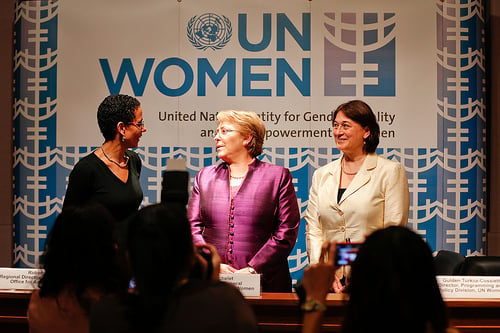
(UN Women/Piyavit Thongsa-Ard)
The UN Security Council’s old boys’ club consensus allowed two male candidates to take the lead over six female candidates in the first round of the 9th UN Secretary General (UNSG) selection despite global civil society’s growing aspirations for the first ever female UNSG.
António Guterres, a former Portuguese prime minister and a United Nations High Commissioner for Refugees (UNHCR) chief from 2005 to 2015, seems most palatable to the 15 UN Security Council members, as the leaked result of the first informal straw ballot on July 21st placed Russia’s preferred female candidate from Bulgaria, Irina Bovoka, third, Anglophone countries’ favorite female candidate, Helen Clark, sixth, and the U.S.’ preferred female candidates from Latin America, Susana Malcorra and Christiana Figures, eighth and ninth. The glass ceiling imposed by the Council’s masculine realpolitik prevails despite the UN’s efforts to imbue the selection process with transparency by organizing the historic televised debate.
Of course, gender itself should not be the sole criterion for finding a capable candidate. Nevertheless, from Britain’s Prime Minister Teresa May to South Korea’s President Park Guen-Hye, women leaders are increasingly visible around the globe these days. With this worldwide rising tide of female leadership, the global public’s call for a female UN leader doubtlessly encapsulates the zeitgeist leadership sought for today’s turbulent international political order.
The world at the dawn of the 21st century is somewhat reminiscent of that of the early 20th century, especially in terms of elite-mass relations on futuristic visions. The currently deepening discrepancy between the elites’ unwarranted optimism for the future guided by technological advancements such as artificial intelligence and the masses’ impulsive pursuit of demagogues’ hyper-emotional and violent nationalist chimeras seem more or less like a déjà vu of the early 20th century’s portents for the emergence of totalitarian regimes.
In a similar way to the discrepancy, machinery was portrayed as a mysterious omnipotent force by early 20th century futurist filmmakers, while imperialist citizens had unconsciously mesmerized themselves with the racist tenets of social Darwinism, gradually becoming insensible to xenophobia. Unfortunately, the early 20th century elites’ futuristic visions were grotesquely conjoined by ultra-nationalist sentiments across the world and ended up inspiring totalitarian rulers like Mussolini, Hitler, and Hirohito to delusively envisage a fascist Pax Romana, Third Reich, and Greater East Asia Co-Prosperity Sphere.
Such totalitarian-regime-led futurist madness in the early 20th century was largely attributable to the innate evil nature within paternalistic leadership, characterized by aggression, violence and intense competition for power. Although the past legacies of paternalistic leadership still thrive, today’s world politics breaks away at least from the shameful history of early 20th century totalitarianism due to the fact that democracies across the globe are increasingly becoming feminized.
Reflecting the painful lessons from the early 20th century history and today’s contrasting development in the feminization of democratic politics, maternalistic leadership is indeed the zeitgeist leadership that can illuminate the 21st century path of world politics. Decision-making under the outcome-oriented instrumental rationality, the pivot of patriarchal leadership, alone is not only vulnerable to falling into the traps of violent rent-seeking behaviors, but also unable to interact effectively with global civil society.
Participatory, inclusive and non-hierarchic characteristics of maternalistic leadership, in contrast, encourage bounded-rationality-driven decision-making and thereby preempt in-group biases and communicate better with global civil society. Furthermore, from the organization theory perspective, the flexibility of maternalistic leadership allows the organization to adaptively transform to today’s quickly changing international political climate. All these boons of maternalistic leadership are the gamut of political skills that the UNSG crucially needs in order to promote healthy and constructive futuristic visions for the 7.4 billion humans. In this respect, further feminization of the UN (feminization of UN leadership) in addition to the foundation of UN Women in 2010 is essential, whether or not the 9th UNSG will be a man or a woman.
Several rounds of informal straw polls are expected to be held in the following weeks, and the UN Security Council members will agree on a single candidate by October. Considering the UN’s tradition of making the appointment based on regional/continent rotation, a candidate from Eastern Europe is likely to be the 9th UNSG. Nevertheless, the whole world is watching this procedural journey for selecting the right UNSG representing the zeitgeist leadership.